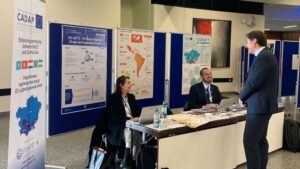
03/04/2024
The three European cooperation programmes support public policies in Latin America, Africa and Central Asia to promote a public health perspective on the drug problem.
18/03/2024
20/03/2024
15/03/2024
The 67th session brought together in Vienna participants from all Member States, UN entities, intergovernmental organisations, civil society and the scientific community related to the world drug problem.
Spain participated with the presence of the Government Delegation for the National Plan on Drugs, the Anti-Drug Prosecutor’s Office, the Intelligence Centre for the Fight against Terrorism and Organised Crime and Spanish Cooperation through the FIIAPP and the European cooperation programmes COPOLAD III, CADAP 7 and EUACT II.
 COPOLAD III, a cooperation programme between Latin America, the Caribbean and the European Union on drug policies, has presented some of its most important results related to the innovation approach it promotes. Natalia Riffo, director of SENDA Chile, presented the social innovation laboratory that COPOLAD III is promoting in Maule to improve the prevention of drug use among minors under state care and that in April will present the first prototypes that have emerged from this process.
COPOLAD III, a cooperation programme between Latin America, the Caribbean and the European Union on drug policies, has presented some of its most important results related to the innovation approach it promotes. Natalia Riffo, director of SENDA Chile, presented the social innovation laboratory that COPOLAD III is promoting in Maule to improve the prevention of drug use among minors under state care and that in April will present the first prototypes that have emerged from this process.
According to the director of COPOLAD III, Borja Díaz Rivillas, present at the CND, “social innovation is one of the approaches prioritised by COPOLAD to accompany countries in the search for solutions to particularly complex drug policy problems that require the mobilisation of a large number of state and civil society actors in the creation of joint solutions“.
CADAP 7, together with UNODC, supported the event “A Public Health Approach to Drug Policy in Central Asia”. The event highlighted the importance of promoting a public health perspective in drug policy in Central Asia, taking into account various international standards in evidence-based prevention and treatment. In addition, emphasis was placed on the drug demand reduction initiatives promoted by CADAP7 and the experiences of Central Asian countries.
The director of CADAP 7, Ernest Robelló, stressed the importance of integrating the public health approach in drug policies to promote the health and well-being of individuals and communities: “It is necessary to balance drug strategies in a more balanced way and from a public health perspective”, he explained.
Finally, EUACT2, a programme funded by the Foreign Policy Instruments Facility (FPI) specialised in the fight against organised crime and the fight against drugs, was present with its Italian and French partners to coordinate the work plan being developed by the programme. “When countries respond to organised crime in general and the fight against drug trafficking in particular in isolation, they are clearly at a disadvantage in the face of this global phenomenon. EUACT2, which has just got off the ground, will facilitate exchanges between practitioners from Asia, Africa and Europe for the first time.


